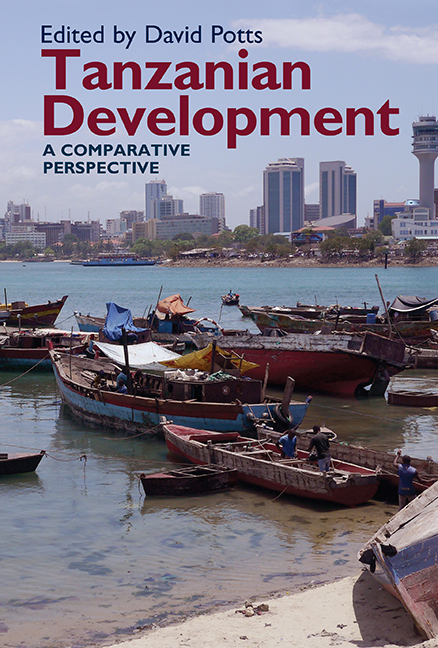Book contents
- Frontmatter
- Contents
- List of Illustrations
- Contributors
- Acknowledgements
- 1 Introduction – Tanzanian Development: A Comparative Perspective
- 2 The Political Economy of Tanzania 1967–2017: Reimagining the State
- 3 Reflections on the Tanzanian Trajectory: Decline and Recovery
- 4 Agricultural Development in Tanzania
- 5 Assets and Poverty Dynamics: The Methodological Challenges of Constructing Longitudinal Surveys in Tanzania
- 6 Contract Farming in Tanzania: Experiences from Tobacco and Sunflower
- 7 ‘We Just Sell Water – That is All We Do’: Two Cases of Small-scale Irrigation in Tanzania
- 8 The Industrial Development of Tanzania in Comparative African Perspective
- 9 Competitiveness in African Manufacturing: Some Evidence from Tanzania
- 10 ‘Good Life Never Comes Like Dreams’: Youth, Poverty and Employment in Arusha
- 11 International Aid to Tanzania – with some comparisons from Ghana and Uganda
- 12 Real Exchange Rate Changes and Export Performance in Tanzania and Ethiopia
- 13 Economic Leakage as a Constraint on Tourism's Effective Contribution to Local Economic Development in Tanzania
- 14 Extractive Industry Revenues and their Expenditure in Local Government Authorities: The Case of the Gold Service Levy in Geita District Council in Tanzania
- 15 Conclusion
- References
- Index
8 - The Industrial Development of Tanzania in Comparative African Perspective
Published online by Cambridge University Press: 24 October 2019
- Frontmatter
- Contents
- List of Illustrations
- Contributors
- Acknowledgements
- 1 Introduction – Tanzanian Development: A Comparative Perspective
- 2 The Political Economy of Tanzania 1967–2017: Reimagining the State
- 3 Reflections on the Tanzanian Trajectory: Decline and Recovery
- 4 Agricultural Development in Tanzania
- 5 Assets and Poverty Dynamics: The Methodological Challenges of Constructing Longitudinal Surveys in Tanzania
- 6 Contract Farming in Tanzania: Experiences from Tobacco and Sunflower
- 7 ‘We Just Sell Water – That is All We Do’: Two Cases of Small-scale Irrigation in Tanzania
- 8 The Industrial Development of Tanzania in Comparative African Perspective
- 9 Competitiveness in African Manufacturing: Some Evidence from Tanzania
- 10 ‘Good Life Never Comes Like Dreams’: Youth, Poverty and Employment in Arusha
- 11 International Aid to Tanzania – with some comparisons from Ghana and Uganda
- 12 Real Exchange Rate Changes and Export Performance in Tanzania and Ethiopia
- 13 Economic Leakage as a Constraint on Tourism's Effective Contribution to Local Economic Development in Tanzania
- 14 Extractive Industry Revenues and their Expenditure in Local Government Authorities: The Case of the Gold Service Levy in Geita District Council in Tanzania
- 15 Conclusion
- References
- Index
Summary
Following decolonization throughout much of Africa, early development plans and policies focused on how to move rapidly from a raw material-exporting economy to a manufacturing industrial economy. Tanzania, although emphasizing the importance of rural development and domestic food production, was no exception in setting out ambitious plans for manufacturing growth. This chapter will try to situate Tanzania's industrialization experience in the context of the wider African experience in order to address the question of why, in Tanzania, as across the continent, economies have not produced the kinds of structural changes that have characterized the growth of manufacturing in other parts of the world.
This chapter will first review Tanzania's manufacturing growth performance over the five decades since independence in comparison with other African countries and the Global South; secondly, consider various explanations that have been given for the performance of Tanzania and countries across the continent; and thirdly, discuss the relatively new theorization and associated policy proposals for more rapid structural change. The chapter will conclude that Tanzania's manufacturing performance has mirrored that of the continent as a whole and, like even the best-performing African economies, Tanzania has yet to develop a strategy for changing its economic structures in order to break away from being predominantly dependent on the export of industrial and agricultural raw materials to service manufacturing elsewhere in the world. However, the advent of a new administration prioritizing such a strategy could significantly change its rate of transformation.
The Early Strategy: Import Substitution
As Weiss and Jalilian explain in Chapter 9 of this volume, the conventional view in the period leading up to decolonization and afterwards was that a key part of the development process was manufacturing industrialization. The growth of manufacturing was expected to begin with the first stage processing of agricultural and mineral raw materials produced by these other sectors, so that more of the value added to products remained within the domestic economy. Consequent upon the accumulation of capital from these industrial activities, investment would take place in intermediate and producer goods industries so that the necessary inputs of machinery and parts would be produced domestically and deepen the industrialization process.
- Type
- Chapter
- Information
- Tanzanian DevelopmentA Comparative Perspective, pp. 163 - 181Publisher: Boydell & BrewerPrint publication year: 2019

